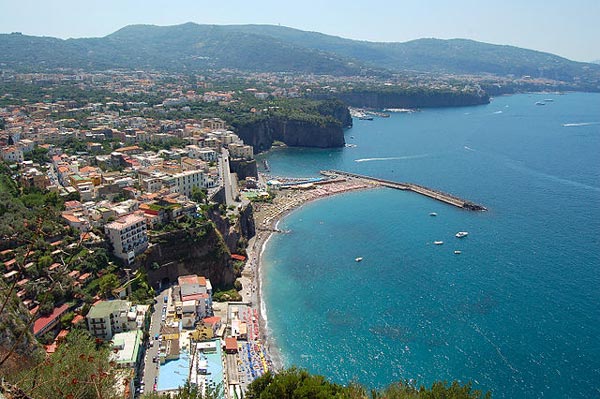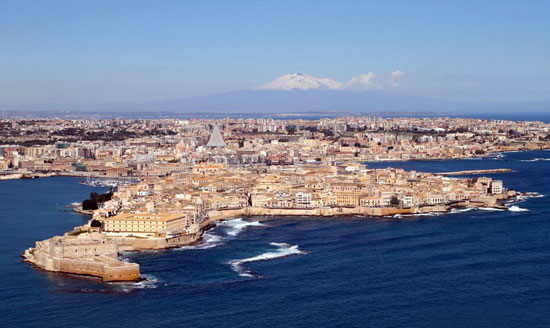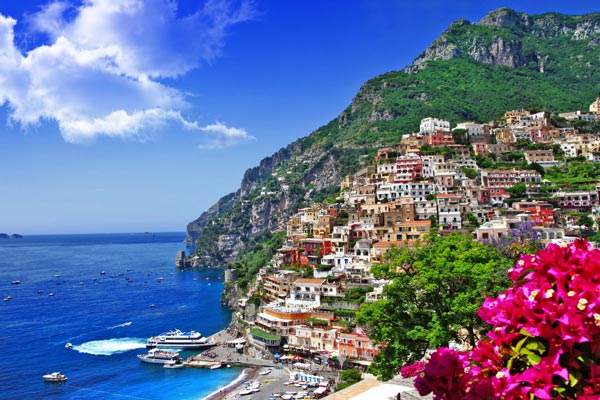♪ Canzone for May 30 Concert
イタリア語では単に歌を指す単語である。しかし、日本国内においては主に19世紀末から20世紀初頭に書かれたイタリアの大衆歌曲、特にナポリのもの(カンツォーネ・ナポレターナ)を指すことが多い。
Torna a Surriento
君は言った「私は行くわ、さようなら。」『帰れ、ソレントへ』は、ソレントの美しい自然と一人の男性の恋心を描くナポリ歌曲。下写真はソレントの風景。

| Vide ‘o mare quant’e bello, Spira tantu sentimento, Comme tu a chi tiene mente, Ca scetato ‘o faie sunna. | 美しい海 感傷をさそう 君の優しき囁き 夢の中へいざなう |
| Guarda, gua’, chistu ciardino; Siente, sie’ sti sciure arance: Nu profumo accussi fino Dinto ‘o core se ne va… | 軽やかな風は オレンジの香りを運び その芳しさは 恋心に沁みる |
| E tu dice: “I’ parto, addio!” T’alluntane da stu core… Da sta terra de l’ammore… Tiene ‘o core ‘e nun turna? | 「私は行くわ、さようなら」君は言った 僕の恋心を見捨て 僕の気持ちを置き去りにして |
| Ma nun me lassa, Nun darme stu turmiento! Torna a Surriento, famme campa! | 行かないでくれ これ以上僕を苦しめないでくれ ソレントへ帰って来てくれ |
| Vide ‘o mare de Surriento, Che tesoro tene ‘nfunno Chi ha girato tutto ‘o munno Nun l’ha visto comma ‘a ccà | ごらん、ソレントの海を 奥底に宝が眠っている 世界中を巡った人も こんな場所は見たことがない |
| Guarda attuorno sti Sserene, ca te guardano ‘ncantate e te vonno tantu bene te vulessero vasà. | あたりをごらん、セイレーンたちが 心奪われあなたを見つめている あなたを大切に思っている 口づけしたいほどに |
| e tu dice:I parto addio! t’alluntane da stu core da la terra de ll’ammore tiene ‘o core ‘e nun turnà? | なのにあなたは言う、「さよなら」と 私の心から遠く離れて そして恋の思い出の地からも 本当に帰る気はないのか |
| Ma nun me lassà nun darme stu turmiento torna a Surriento famme campà! | 行ってはいけない 私を悲しませないで 帰れソレントへ 私を助けて |
| Vide ‘o mare de Surriento Che Tesoro tene nfunno; Chi ha girato tutto ‘o munno Nun I’ha vista comm’ a cca. | (IT) Vedi il mare di Sorrento, Che tesori ha sul fondo: Chi ha girato tutto il mondo Non l’ha visto come qua. |
| Guarda attuorno sti Sserene, Ca te guardano’ncantate E te vanno tantu bene… Te vulessero vasa | Guarda intorno queste Sirene, Che ti guardano incantate, E ti vogliono tanto bene… Ti vorrebbero baciare. |
| E tu dice;“I’parto, addio!” T’alluntane da stu core… Da la terra de I’ammore… Tiene ‘o core ‘e nun turna? | E tu dici: “Io parto, addio!” Ti allontani da questo cuore… Dalla terra dell’amore… Hai il cuore di non tornare? |
| Ma nun me lassa, Nun darme stu turmiento! Torna a Surriento, Famme campa! | Ma non mi lasciare, Non darmi questo tormento! Torna a Sorrento, Fammi vivere!» |
Funiculi, Funicula!
フニコラーレは、イタリアのベスビオ火山山頂まで観光客を運ぶ登山電車として、1880年にトーマス・クック旅行会社により敷設されたケーブルカー。

| Aieressera, oì nè, me ne sagliette, tu saie addò? Addò ‘stu core ‘ngrato cchiù dispietto farme nun pò! Addò lo fuoco coce, ma si fuie te lassa sta! E nun te corre appriesso, nun te struie, ‘ncielo a guardà!… Jammo ‘ncoppa, jammo jà, funiculì, funiculà! | 昨日の晩、すごい物に乗ったんだ こんな気持ち初めてだよ 火の吹く山へひとっ飛び 怖くて逃げても大丈夫 疲れしらずで景色を楽しもう! さあ行こう!行こう! フニクリ・フニクラ! |
O sole mio
1898年に作曲されたカンツォーネ・ナポレターナ(ナポリ歌曲)。ハバネラのリズムが特徴的。
| Che bella cosa na jurnata ‘e sole, n’aria serena doppo na tempesta Pe’ ll’aria fresca pare gia` na festa Che bella cosa na jurnata ‘e sole | 素晴らしきかな 太陽輝く一日 嵐の後の爽やかな空気 休日にそよ吹く新鮮な空気 素晴らしきかな 太陽輝く一日 |
| Ma n’atu sole, cchiu` bello, oi ne’, ‘o sole mio, sta nfronte a te! ‘o sole, ‘o sole mio! sta nfronte a te! sta nfronte a te! | 更に美しいのは もう一つの私の太陽 君の瞳に輝く僕だけの太陽 君の瞳に輝く 君の瞳に輝く |
| Quanno fa notte e ‘o sole se ne scenne, me vene quase ‘na malincunia; sotto ‘a fenesta toia restarria quanno fa notte e ‘o sole se ne scenne. | 夜が来て、太陽が沈み切った時、 憂鬱がわだかまり始めた。 君の窓の下に私は留まる 夜が来て、太陽が沈み切った時。 |
| Ma n’atu sole, cchiù bello, oje ne’ ‘O sole mio sta ‘nfronte a te! ‘O sole, ‘o sole mio sta ‘nfronte a te! sta ‘nfronte a te! | だけどもう一方の太陽 なお一層輝かしい 私の太陽 君の顔に輝く! 太陽、 私の太陽 君の顔に輝く! 君の顔に輝く! |
18世紀のイギリスで出版された歌曲。歌詞はイタリア語で作詞者は不明。作曲者は、イタリア、ナポリ出身の作曲家トンマーゾ・ジョルダーニ。

| Caro mio ben, credimi almen, senza di te, languisce il cor. Il tuo fedel, sospira ognor. Cessa, crudel, tanto rigor! | 愛しい人よ、信じておくれ 君に会えず 恋焦がれる日々 君に忠実な男は ため息ばかり どうか冷たくしないでおくれ |
ルーシーの母親は長年難病を患っていたが、ルーシーがキリスト教の聖人アガサ(St.Agatha)に祈り続けた結果、その難病が奇跡的に治癒されたという。

| Sul mare luccica l’astro d’argento, placida è l’onda, prospero è il vento Venite allàgile barchetta mia! Santa Lucia! Santa Lucia! | 輝く海 輝く星空 波は穏やかに、風は軽やかに 私の小舟よ 軽快に進め 聖ルチア! 聖ルチア! |
| Con questo zeffiro così soave, oh! com’è bello star sulla nave! Su passeggeri, venite via! Santa Lucia! Santa Lucia! | とても甘い西風(そよ風) ああなんて美しいんだ。船の上では 乗っている人たち、行きましょう! サンタ・ルチア サンタ・ルチア |
| O dolce Napoli, o suol beato, ove sorridere volle il creato! Tu sei l’impero dell’armonia! Santa Lucia! Santa Lucia! | ああ優しいナポリ、ああ幸せの土地 創造物が微笑む あなたは調和の帝国だ サンタ・ルチア サンタ・ルチア |
| Or che tardate? Bella è la sera, spira un’auretta fresca e leggera. Venite allàgile barchetta mia! Santa Lucia! Santa Lucia! | どうして遅いのか?夕暮れは美しい 清らかな軽いそよ風 早く私の小舟へ来て! サンタ・ルチア サンタ・ルチア |
Time To Say Goodbye
盲目のテノール歌手ボチェッリとサラ・ブライトマンのデュエット曲。別れの曲ではなく愛し合う二人の「一緒に生きて行こう」とする二人の門出の歌だ!
| Quando sono sola sogno all’orizzonte e mancan le parole, si lo so che non c’è luce in una stanza quando manca il sole, se non ci sei tu con me, con me. Su le finestre mostra a tutti il mio cuore che hai accesso, chiudi dentro me la luce che hai incontrato per strada | 一人でいる時 水平線を夢見て 言葉を失ってしまう 太陽のない部屋は暗くて あなたが側にいないと 太陽は消えてしまうの 全ての窓から あなたが勝ち取った 私の心が広がってゆく 私の中に 私の中に あなたは光を注ぎ込んだの 道端で見つけた光を |
| Time to say goodbye. Paesi che non ho mai veduto e vissuto con te, adesso si li vivrò. Con te partirò su navi per mari che, io lo so, no, no, non esistono più, it’s time to say goodbye. | 別れの時が来たわ 見たことも 行ったこともない場所 今あなたと共に 船に乗り海を越えて 旅立とう もう なくなって しまった海を 越えて 別れの時が来たわ |
| Quando sei lontana sogno all’orizzonte e mancan le parole, e io si lo so che sei con me con me, tu mia luna tu sei qui con me, mio sole tu sei qui, con me, con me, con me, con me. | 君が遠く離れているとき 水平線を夢見て 言葉を失ってしまう でももちろん分かっている 君が僕と一緒にいることは 君は僕の月 僕と共に 僕の太陽 君は僕と共にここにいる 僕と共に 僕と共に |
| Time to say goodbye. Paesi che non ho mai veduto e vissuto con te, adesso sì li vivrò. Con te partirò su navi per mari che, io lo so, no, no, non esistono più, | 別れの時が来たわ 見たことも 行ったこともない場所 今 あなたと共に 船に乗り海を越えて 旅立とう もうなくなって しまった海を越えて |
| con te io li rivivrò. Con te partirò su navi per mari che, io lo so, no, no, non esistono più, con te io li rivivrò. Con te partirò. | 共によみがえらせよう 一緒に船に乗り 海を越えてゆこう もうなくなってしまった海へ 二人で海をよみがえらせよう 二人で行こう あなたと私 |
Barcarolle-Offenbach
Belle nuit, ô nuit d’amour also known as the Barcarolle from Jacques Offenbach’s opera, The Tales of Hoffman . A barcarole is a folk song sung by Venetian gondoliers, or a piece of music composed in that style. In classical music, it is one of the most famous barcaroles. Good night and sweet dream to you’ll.
| Belle nuit, ô nuit d’amour Souris à nos ivresses Nuit plus douce que le jour Ô, belle nuit d’amour! Le temps fuit et sans retour Emporte nos tendresses Loin de cet heureux séjour Le temps fuit sans retour Zéphyrs embrasés Versez-nous vos caresses Zéphyrs embrasés Donnez-nous vos baisers! Vos baisers! Vos baisers! Ah! Belle nuit, ô, nuit d’amour Souris à nos ivresses Nuit plus douce que le jour, Ô, belle nuit d’amour! Ah! souris à nos ivresses! Nuit d’amour, ô, nuit d’amour! Ah! ah! ah! ah! ah! ah! | 美しい夜、おお恋の夜 喜びに微笑む またとない甘き時間 おお美しき恋の夜よ! 過ぎ行く時は 戻ることなく 慈愛の情も遠く運び去る 時は過ぎ行く 戻ることなし そよ風が優しく包む そっと口づけを残して 美しい夜、おお恋の夜 喜びに微笑む またとない甘き時間 おお美しき恋の夜よ! またとない甘き時間 恋の夜よ!恋の夜よ! |









































































































































































































































